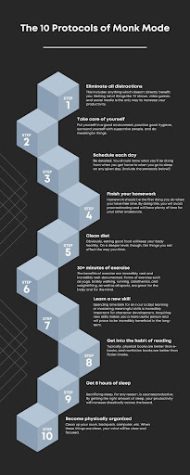Deadline delimmas: procrastination vs. structure

Photo courtesy of Whitney Moffa
Some students will do whatever they can in avoidance of their work. A study published in the academic journal Frontiers in Psychology found a link between mobile phone usage and procrastination among students.
The difference between putting off schoolwork and tackling it far in advance is a discussion that leaves many students wondering which academic tactic is superior: procrastination or structure.
A study conducted by online test preparation company Magoosh found that 86% of high school students said they procrastinate on assignments. Due to students’ hectic schedules, with extracurriculars and distractions making it difficult to get things done in the first place, procrastination is a tactic often employed.
“I just have all of these assignments and I don’t feel like doing them so I’m just like ‘I’ll do it later’, but then, it’s later, and it’s due! And then it’s missing!” stated freshman Caitlyn Delaney who has had troubling experiences with procrastination.
According to Merriam-Webster’s dictionary, procrastination means “to put off intentionally the doing of something that should be done.” Although this may be the technical definition, over the years, procrastination in society has become synonymous with unproductivity.
For some students, their mentality is an obstacle. Navigating the specifics of waiting to complete tasks can be difficult. Flaws of procrastinating are occasionally highlighted in the outcome of the task in that the quality of work may suffer.
“I usually procrastinate on really simple assignments and studying especially. That is when it gets really stressful because you didn’t study, and so you are rushing to study everything.” said freshman Emily Yelnicker.
While many choose to put tasks off right up to the deadline, for some, it isn’t purposeful. Factors such as mental burnout, or conditions like ADHD, contribute to work delay and stress buildup.
“With ADHD you have executive dysfunction, and one type is having a hard time starting complicated questions, assignments, or just general tasks,” said a sophomore who wishes to remain anonymous. “Unless an assignment is something I genuinely enjoy, I just can’t find it in myself to do the assignment unless I am forced to do it.”
Stigmas invade the conversation about ADHD induced procrastination, and some have a tendency to dismiss it.
“It’s just discrediting to call someone with ADHD lazy because most of the time we are some of the most productive people and we’re just trying our best,” expressed the same student. “I don’t like procrastinating and every time someone just tells me to stop I would really like to but I physically can’t not do it.”
Although some students are unable to control their mindset when it comes to deadlines, some wish to stop procrastinating altogether due to the stress that it creates in their lives. Health and Physical Education teacher and WS alumnus Amy Berglund has learned to stop procrastinating, an action that she personally found made her anxious.
“I was definitely a procrastinator and I would save assignments until the last minute. I needed that anxiety to get it done, but I have tried to get a little bit better now that I have gotten older because I don’t need the extra stress,” explained Berglund.
Over the years, Berglund developed certain tactics and ways to combat having to rush at the last minute on schoolwork, resulting in success.
“I think it’s realizing that you want to do a good job and just putting in place things to help you get it done. Maybe it’s not watching TV, and saying ‘I’m going to do this part, and then reward myself,’” she explained.
On the flip side, a number of students stay vigilantly organized and take a route of complete structure in school. This is able to result in maximum productivity and insurance on completion of tasks, with a lack of stressful last-minute study sessions.
“I feel like I am someone who is really structured because I am a person where you have to follow a plan, and if you don’t follow the plan, then it doesn’t get followed through enough,” said freshman Maddie Whitehouse. “I feel like getting everything done in a structured order for me allows for a balance.”
While procrastination is able to provide short term comfort for students, Whitehouse prefers to structure her work to maintain stability.
“I look at my assignments and just get everything done because if I don’t, then you have a whole list of everything,” explained Whitehouse. “I will find myself procrastinating at times, but I am able to catch myself normally right as I do it.”
Despite all of the cons of procrastination, in recent years, students have become more open-minded about it. According to some students such as Yelnicker, procrastination can be seen as beneficial in school for creativity and efficiency.
“[Procrastination] doesn’t not work because when I finally sit down and do it, I have to do it because I don’t really have a choice because I need to do it ‘now’,” she said. “It gives me the extra push I need to do it, and I do it well, and it’s fine.”
According to Whitehouse, students should simply do what works best for them to ensure their work gets completed.
“Even if you have structure, even if you procrastinate,” said Whitehouse. “I feel like there are still negatives because it is still a huge amount [of work], and it is just a lot to deal with especially at our age.”
Procrastination and structure can work hand in hand in most cases, often producing similar results. At the end of the day, whether it be now or later, deadline dilemmas can only be solved by doing the work.










